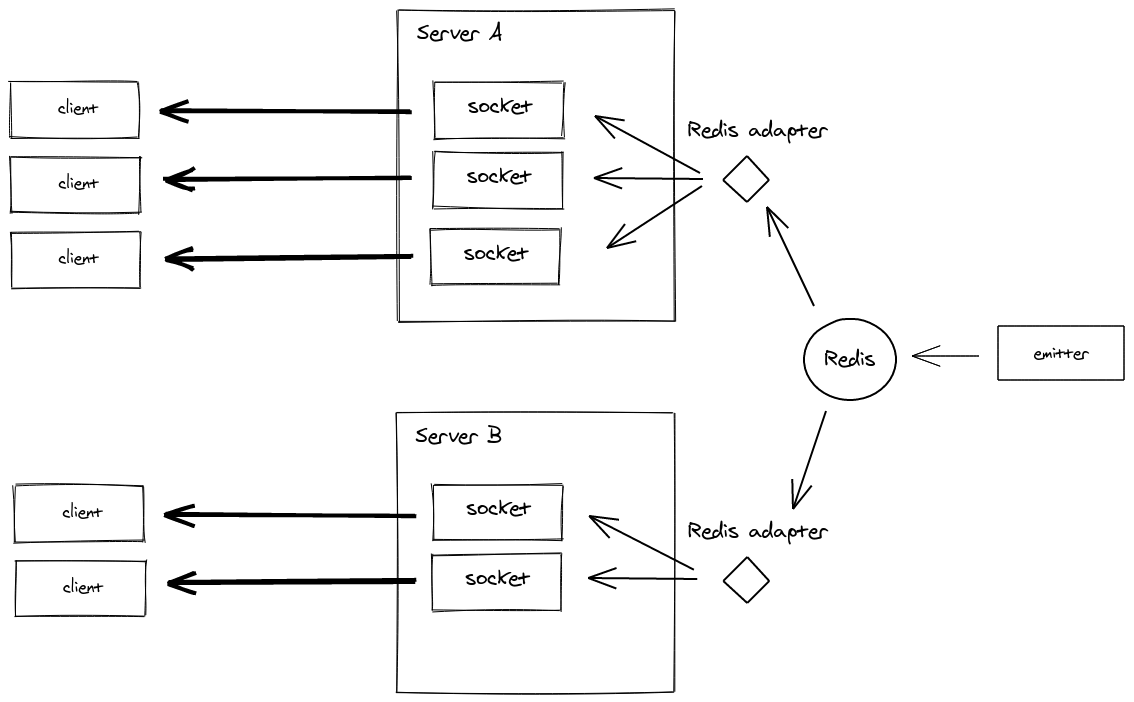Expand description
The Socketioxide Emitter crate allows you to easily communicate with a group of Socket.IO servers from another rust process (server-side). It must be used in conjunction with socketioxide-redis.
Socketioxide Emitter is not compatible with
@socketio/redis-adapter
and @socketio/redis-emitter. They use completely different protocols and
cannot be used together. Do not mix socket.io JS servers with socketioxide rust servers.
If you are looking for a way to emit events to a cluster of node socket.io servers in rust,
you should use the socketio-rust-emitter package.
§Diagram taken from the socket.io documentation:

§Features and parsers
The emitter supports two parsers: Common and MessagePack. You can enable/disable them with the parser-common
and parser-msgpack feature flags. If you disable all features, you won’t be able to emit events.
It will be only possible to manipulate sockets (join/leave rooms, disconnect).
§Emit cheat sheet (example with redis)
use redis::{AsyncCommands, aio::MultiplexedConnection};
use socketioxide_emitter::{Driver, IoEmitter};
struct RedisConnection(MultiplexedConnection);
impl Driver for RedisConnection {
type Error = redis::RedisError;
async fn emit(&self, channel: String, data: Vec<u8>) -> Result<(), Self::Error> {
self.0
.clone()
.publish::<_, _, redis::Value>(channel, data)
.await?;
Ok(())
}
}
#[tokio::main]
async fn main() -> Result<(), Box<dyn std::error::Error>> {
let client = redis::Client::open("redis://127.0.0.1").unwrap();
let conn = client.get_multiplexed_tokio_connection().await?;
let conn = RedisConnection(conn);
// sending to all clients
IoEmitter::new().emit("event", "hello!", &conn).await?;
// sending to all clients in 'room1' room
IoEmitter::new().to("room1").emit("event", "message", &conn).await?;
// sending to all clients in 'room1' except those in 'room2'
IoEmitter::new().to("room1").except("room2").emit("event", "message", &conn).await?;
// sending to individual socketid (private message).
// (You will have to make the socket join a room corresponding to its id when it connects.)
IoEmitter::new().to("tK3lxSproMuTbioPAAAB").emit("event", "message", &conn).await?;
let nsp = IoEmitter::new().of("/admin");
// sending to all clients in 'admin' namespace
nsp.clone().emit("event", "message", &conn).await?;
// sending to all clients in 'admin' namespace and in 'notifications' room
nsp.to("notifications").emit("event", "message", &conn).await?;
let msgpack = IoEmitter::new_msgpack();
// sending to all clients and encode message with the msgpack format.
msgpack.clone().emit("event", "message", &conn).await?;
// sending to all clients in 'notifications' room and encode message with the msgpack format.
msgpack.to("notifications").emit("event", "message", &conn).await?;
Ok(())
}Structs§
- IoEmitter
- The
IoEmitteris the main structure for emitting events to a socket.io cluster. It provides a convenient way to broadcast events to all connected nodes and clients. It acts as a simple builder for creating socket.io messages to send through the driver.
Enums§
- Emit
Error msgpack-parserorcommon-parser - An error that occurs when broadcasting messages.